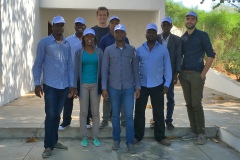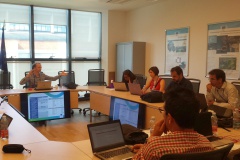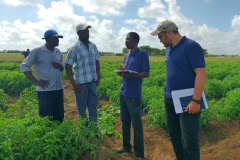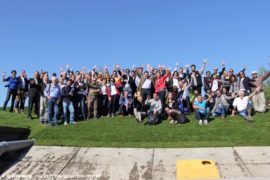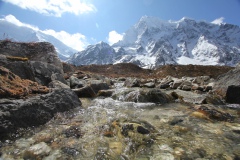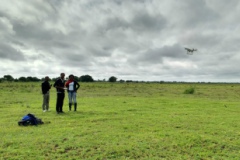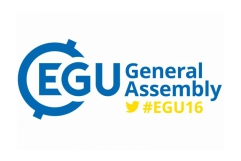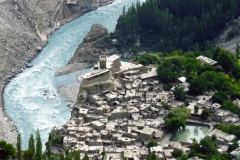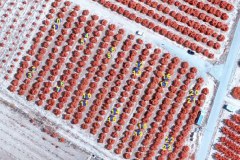Category: Uncategorized
7 August 2016
First week of successful training in Water Resources Modeling for ARA-Sul and ARA-Norte, Mozambique
During the week of 11-15 July, training in Water Resources Modeling (using SPHY) was provided to ARA-Sul and ARA-Norte (water boards) in Mozambique. This training was funded by NUFFIC’s Tailor-Made Training Programme, which is part of the Netherlands Fellowship Programmes (NFP II), and is specifically meant to enhance the overall functioning of an organization by...
7 July 2016
FutureWater organizes coordination meeting for IMPREX project at EU Joint Research Centre
On 27 and 28 June, IMPREX partners working on agriculture and droughts gathered in the premises of the EU Joint Research Centre (JRC) in the Italian city of Ispra. The two-day meeting provided an opportunity to review recent progress, coordinate future actions, and to establish links with relevant activities and laboratories of the JRC. The...
5 July 2016
Identifying and designing business models for the ThirdEye project in Mozambique
How to be a commercial business, and at the same time reach out to the rural poor and enable them to increase their food production and improve their livelihoods? The key ingredient for success is getting the right business model! Agricultural Business Developer Jelle van den Akker investigated the transition of the ThirdEye project from a...
7 June 2016
FutureWater participates in the BRIGAID project kick-off meeting
During the 12th and 13th of May, the kick-off meeting of the BRIGAID project took place at the Technical University of Delft (Netherlands). This EU-Horizon2020 project supports those innovations which aim to reduce the impacts of floods, droughts and extreme weather events. The BRIGAID’s mission is to turn already existing prototypes into market-ready products. This...
25 May 2016
PhD research: More water in Asian rivers due to climate change
Text adopted from Utrecht University On Friday 27 May Arthur Lutz defends his PhD thesis, which is the result of a joint PhD project by FutureWater and Utrecht University. He concludes that climate change will lead to more rainfall and meltwater, thus leading to more water in Asian rivers. More than one billion Most large rivers...
29 April 2016
ThirdEye: Training new Flying Sensor operators in Mozambique
A key factor in enabling an increase and efficiency in food production is providing farmers with relevant information. Such information is needed as farmers have limited resources (seed, water, fertilizer, pesticides, human power) and are always in doubt in which location and when they should supply these resources. Interesting is that especially smallholders, with their...
28 April 2016
FutureWater contributes to the EGU General Assembly 2016
Results of several ongoing projects of FutureWater were being disseminated among a large group of scientists last week during the General Assembly 2016 of the European Geosciences Union (EGU). The EGU General Assembly was held at the Austria Center Vienna (ACV) in Vienna, Austria, from 17 to 22 April 2016. It is the largest conference on the...
13 April 2016
PhD position: Development of Future Weather techniques for flood risk assessment
We are delighted that you consider joining the ETN System-Risk as an Early Stage Research (ESR) fellow. System-Risk is a Marie-Skłodowska-Curie European Training Network which aims on developing and implementing a systems approach for large-scale flood risk assessment and management and provides a framework for training and career development of 15 Early Stage Researchers (ESRs). The network brings...
29 February 2016
FutureWater presents at conference on Climate Change Impacts for Indus Basin Waters
An International Conference on Climate and Environmental Change Impacts on the Indus Basin Waters was organized jointly by ICIMOD, The World Bank Group and the International Water Management Institute from 16 to 19 February 2016 in Kathmandu, Nepal. The Indus River Basin is shared by four countries Afghanistan, China, India, and Pakistan. The Indus Basin...
22 February 2016
FutureWater receives award for the best contribution on precision agriculture and flying sensors
The contribution “Spectral and physiological responses of Citrus irrigated with saline reclaimed water combined with deficit irrigation strategies” was recently awarded as the best submission in the “Precision Agriculture” thematic panel of the 2nd Spanish Symposium of Horticultural Engineering held in Almeria between 12-16 February. The contribution was led by Cristina Romero and is the...
